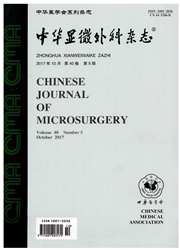

 中文摘要:
中文摘要:
目的探讨显微修薄股前外侧穿支(ALTP)皮瓣在口腔颌面部软组织缺损精细修复重建中的应用并评价其临床效果。方法2014年1月-2015年9月,采用显微修薄ALTP皮瓣修复42例口腔癌患者肿瘤根治术后的软组织缺损,术前通过手持式声学多普勒初步确定穿支数目、位置,于髂前上棘与同侧髌骨外侧缘连线中点附近穿支血管标记点内侧纵行切开皮肤及皮下,使用手术显微镜或放大镜于阔筋膜上寻找、解剖穿支血管并确认其走行方式与类型,根据原发灶切除后组织缺损的范围设计皮瓣的大小,同时依据缺损的深度或拟重建器官的三维形态,对皮瓣进行个性化修薄,精确修复组织缺损、重建器官形态。结果42例患者共采用45块显微修薄股前外侧穿支皮瓣修复舌、颊、口底及牙龈等部位的软组织缺损均获得成功,其中28块含单一穿支血管,14块含2条穿支血管,3块含3条穿支血管。直接皮支型穿支28条,筋膜皮支型穿支13条,筋膜支型穿支24条。1例患者术后6 h出现颈部血肿,再次手术清除血肿结扎出血点后皮瓣成活,4例患者皮瓣边缘部分坏死,积极清创换药后愈合。术后随访6-24个月,皮瓣受区外形满意,供区切口瘢痕细微,患者语音及吞咽功能恢复良好。结论显微修薄ALTP皮瓣能个性化修复舌、颊、口底等部位软组织缺损,较好地恢复其外形及功能,且供区损伤小,是精细修复口腔颌面部软组织缺损的理想方法。
 英文摘要:
英文摘要:
ObjectiveTo investigate the application of microdissected thin anterior lateral thigh perforator flap (ALTP flap) in precise reconstruction of oral and maxillofacial soft tissue defects and to assess the clinical reconstruction outcome.MethodsFrom January, 2014 to September, 2015, utilizing the technique of microdissected thin anterior lateral thigh flaps to repair the defects resulted from radical resections of primary sites in 42 patients with oral cancer. Before the operation, the dominant perforator was detected and marked on the skin where the planned flap would be harvested later by Doppler probing. Initial incision was made medial to the perforator marker. Careful dissection was conducted suprafascially to isolate the dominant perforator as well as identifying its source and type. The size of flap was determined according to the area of defect after tumor ablation. Meanwhile the flap was thinned in accordance with the contour of the defect or the organ to be reconstructed. The procedure should be performed under operating microscope.ResultsForty-five microdissected thin ALTP flaps were harvested and used to reconstruct the defects of tongue, buccal, oral floor, and gingiva in 42 patients. Among them, 28 flaps were nourished by single perforator, 14 flaps were nourished by 2 perforators, and 3 flaps were nourished by 3 perforators. In total, 65 perforators were identified, in which 28 were direct cutaneous branches, 13 were fascia-cutaneous branches, and 24 were fascia branches. One take-back occurred within 6 hours due to cervical haematoma. During re-exploration, pedicle compression was found. And the flap was salvaged successfully after haemotoma removement and proper bleeding point ligation. Four flaps underwent marginal necrosis which healed smoothly after debridement and dressing changes. Post-operative 6 to 24 months’ follow-up showed satisfactory appearance of the recipient sites with favorable speech and swallowing function. All donor sites were closed primarily, leaving no donor-site complic
 同期刊论文项目
同期刊论文项目
 同项目期刊论文
同项目期刊论文
 期刊信息
期刊信息
